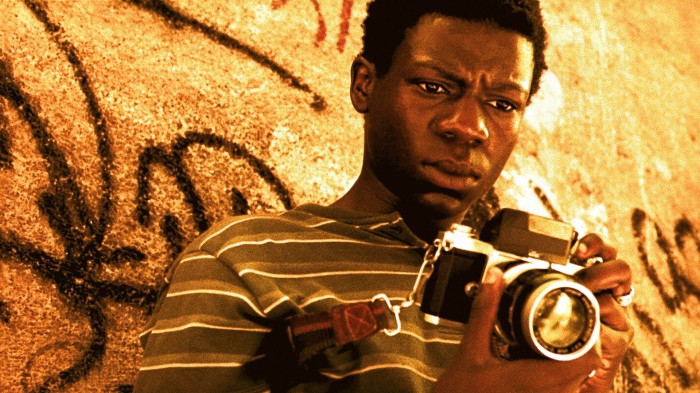Directors: Fernando Meirelles & Kátia Lund (co-director)
Year: 2002
Runtime: 130 minutes
Rating: 10/10
“You need more than guts to be a good gangster. You need ideas.”

In his excellent article What Makes a Movie Good FilmCritHulk argues that: “a film is not a checklist.” You can’t calculate the quality of a film by looking at how good its individual elements are and adding them up, and you can’t discredit any film for “lacking” something that’s normally considered good. Character development, for instance, usually strengthens a story, but plenty of masterpieces work better without (like A Seperation, [Farhadi, 2011]).
I completely agree with this, but if you could calculate a film’s worth by adding its individual achievements up, City of God would’ve been an easy 10. The film excels in every possibly way a movie can: It’s entertaining, funny, exciting, moving; it’s epic yet intimate and personal; its scripts is sprawling yet airtight and nuanced; its editing, cinematography and sound design are gritty and grounded yet purposefully stylised. The acting, despite being 99% non-actors and children, is good to great (though according to this interview, much of the credit for the acting should probably go to the film’s editor, Daniel Rezende).
Non the less, despite being spectacular in every isolated way, the different aspects of City of Gods ultimately adds up to something greater that the sum of their parts. Foreign language films are rarely nominated for other academy awards than best foreign language picture, but City of God was (deservedly) nominated both for its direction, script, cinematography and editing. The film is part gangster epic, part action film, part comedy and part coming of age story. It’s ballsy to attempt to be all of these thing; it’s miraculous to succeed, but here we are.

Based on Paulo Lins’ semi-autobiographical book, City of God tracks the rise of a criminal wave in a suburb of Rio de Janero. The film spans three decades, from the late 1960s to the early 80s, and jumps from flashback to flashback, tangent to tangent, to fill in backstory and let you follow a myriad of different characters. The film has a protagonist and narrator, Rocket, but he is simply an entrance point for the audience;the prism through which we view the ups and downs of an entire society.
The film feels like a high-wire act constantly on the verge of collapsing under its own ambition, but the sheer chutzpah of the filmmaking powers through any doubts you might have. Daniel Rezende’s editing is remarkable in numerous ways. As mentioned, it extracted good performances from all the amateur child actors. It also keeps the film moving at the speed of a bullet, without ever feeling rushed; it seamlessly blends different cinematic styles and different narrative plot lines. But Rezende’s most impressive feat is perhaps that the audience always maintains an overview of the different plot-lines and characters; while the film lasts 130 minutes, there’s barely enough time for all its story and characters. Rezende’s control over everything from pacing to tone and performances makes its difficult to accept this was first feature; before the film is over Rezende has used every editing trick in the book, from freeze-frame to fast-motion, to wonderful effect.

Shot on gorgeous 16mm film, City of God is filled with grain and blown-out highlights which bring a gritty realism to the film. César Charlone’s cinematography mixes a documentary aesthetic with stylized camera moves and endless close-ups, but nothing ever feels contrived. The film never favors style for style’s sake: there’s a purpose to every flashy swoosh. In the beginning (and end) of the film, when Rocket is trapped between a gang and the police, the camera circles around him to give the audience the same disorienting feeling Rocket is experiencing. He’s suddenly surrounded and his world is spinning out of control: the shot literary reflect this. There’d be no effect here if director Fernando Meirelles constantly sent the camera circling around his characters, but because he only does so here, the move has its intended effect.
The script is a minor miracle. There’s a constant cause and effect that brings weight to every scene, and all the actions taken by the characters are smoothly set up by previous scenes. But the details are what truly elevates this script. It constantly turns scenes on their heads, sometimes to riveting effect, sometimes to hilarious, but always in a way that feels organic and honest. In one scene, two youths try to rob a bus conductor, but has to abandon the mission because he was too cool a dude to rob.

Despite all the life-or-death situations and coming-of-age drama, the film never becomes melodrama. Meirelles’ direction is powerfully blasé*. There are rare exceptions (especially when one child is forced to shoot another), but must scenes never feel manipulative.
*This is taken too far in one scene, where someone getting shot in the head is turned into a joke. In a film that otherwise presents violence in a responsibly horrific way, this moment stands out as a tone-deaf touch.
This isn’t a perfect film – no film is, but its flaws are all minor and forgivable, while its triumphs are many and impossible to ignore. More than anything specific thing you can complement the film for, it’s simply made with such gusto and filled with so much soul, it’s practically brimming with verve from its opening frame to its closing. From its audacious opening to its bittersweet ending, City of God stands tall as an example of just how good films sometimes gets.
Links:
https://en.wikipedia.org/wiki/City_of_God_(2002_film)
http://www.imdb.com/title/tt0317248/combined